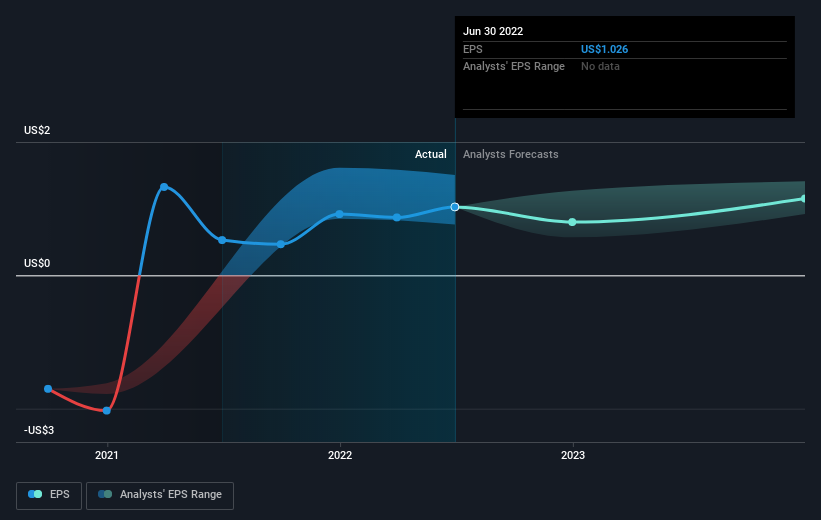TPG RE Finance Trust (NYSE:TRTX) sheds US$101m, company earnings and investor returns have been trending downwards for past five years
For many, the main point of investing is to generate higher returns than the overall market. But even the best stock picker will only win with some selections. So we wouldn't blame long term TPG RE Finance Trust, Inc. (NYSE:TRTX) shareholders for doubting their decision to hold, with the stock down 65% over a half decade. And some of the more recent buyers are probably worried, too, with the stock falling 45% in the last year. Furthermore, it's down 26% in about a quarter. That's not much fun for holders.
Since TPG RE Finance Trust has shed US$101m from its value in the past 7 days, let's see if the longer term decline has been driven by the business' economics.
See our latest analysis for TPG RE Finance Trust
There is no denying that markets are sometimes efficient, but prices do not always reflect underlying business performance. One imperfect but simple way to consider how the market perception of a company has shifted is to compare the change in the earnings per share (EPS) with the share price movement.
During the five years over which the share price declined, TPG RE Finance Trust's earnings per share (EPS) dropped by 9.7% each year. This reduction in EPS is less than the 19% annual reduction in the share price. This implies that the market was previously too optimistic about the stock. The low P/E ratio of 6.85 further reflects this reticence.
The graphic below depicts how EPS has changed over time (unveil the exact values by clicking on the image).
We know that TPG RE Finance Trust has improved its bottom line lately, but is it going to grow revenue? Check if analysts think TPG RE Finance Trust will grow revenue in the future.
What About Dividends?
As well as measuring the share price return, investors should also consider the total shareholder return (TSR). Whereas the share price return only reflects the change in the share price, the TSR includes the value of dividends (assuming they were reinvested) and the benefit of any discounted capital raising or spin-off. It's fair to say that the TSR gives a more complete picture for stocks that pay a dividend. As it happens, TPG RE Finance Trust's TSR for the last 5 years was -43%, which exceeds the share price return mentioned earlier. This is largely a result of its dividend payments!
A Different Perspective
While the broader market lost about 22% in the twelve months, TPG RE Finance Trust shareholders did even worse, losing 40% (even including dividends). However, it could simply be that the share price has been impacted by broader market jitters. It might be worth keeping an eye on the fundamentals, in case there's a good opportunity. Regrettably, last year's performance caps off a bad run, with the shareholders facing a total loss of 7% per year over five years. We realise that Baron Rothschild has said investors should "buy when there is blood on the streets", but we caution that investors should first be sure they are buying a high quality business. I find it very interesting to look at share price over the long term as a proxy for business performance. But to truly gain insight, we need to consider other information, too. Even so, be aware that TPG RE Finance Trust is showing 3 warning signs in our investment analysis , and 1 of those is a bit unpleasant...
But note: TPG RE Finance Trust may not be the best stock to buy. So take a peek at this free list of interesting companies with past earnings growth (and further growth forecast).
Please note, the market returns quoted in this article reflect the market weighted average returns of stocks that currently trade on US exchanges.
Have feedback on this article? Concerned about the content? Get in touch with us directly. Alternatively, email editorial-team (at) simplywallst.com.
This article by Simply Wall St is general in nature. We provide commentary based on historical data and analyst forecasts only using an unbiased methodology and our articles are not intended to be financial advice. It does not constitute a recommendation to buy or sell any stock, and does not take account of your objectives, or your financial situation. We aim to bring you long-term focused analysis driven by fundamental data. Note that our analysis may not factor in the latest price-sensitive company announcements or qualitative material. Simply Wall St has no position in any stocks mentioned.
Join A Paid User Research Session
You’ll receive a US$30 Amazon Gift card for 1 hour of your time while helping us build better investing tools for the individual investors like yourself. Sign up here

 Yahoo Movies
Yahoo Movies 

